Related Research Articles
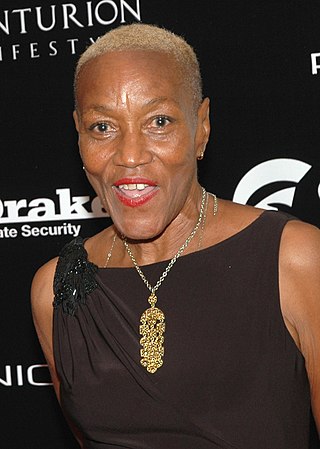
Gloria Richetta Jones is an American singer and songwriter who first found success in the United Kingdom, being recognized there as "The Queen of Northern Soul". She recorded the 1965 hit song "Tainted Love" and has worked in multiple genres as a Motown songwriter and recording artist, backing vocalist, and as a performer in musicals such as Hair. In the 1970s, she was a keyboardist and vocalist in Marc Bolan's glam rock band T. Rex. She and Bolan were also in a committed romantic relationship and had a son, Rolan Bolan, together.

William Everett Preston was an American keyboardist, singer and songwriter whose work encompassed R&B, rock, soul, funk, and gospel. Preston was a top session keyboardist in the 1960s, during which he backed artists such as Little Richard, Sam Cooke, Ray Charles, the Everly Brothers, Reverend James Cleveland, the Beatles and the Rolling Stones. He gained attention as a solo artist with hit singles such as "That's the Way God Planned It", the Grammy-winning "Outa-Space", "Will It Go Round in Circles", "Space Race", "Nothing from Nothing", and "With You I'm Born Again". Additionally, Preston co-wrote "You Are So Beautiful", which became a #5 hit for Joe Cocker.
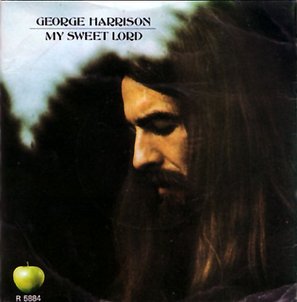
"My Sweet Lord" is a song by English musician George Harrison, released in November 1970 on his triple album All Things Must Pass. It was also released as a single, Harrison's first as a solo artist, and topped charts worldwide; it was the biggest-selling single of 1971 in the UK. In America and Britain, the song was the first number-one single by an ex-Beatle. Harrison originally gave the song to his fellow Apple Records artist Billy Preston to record; this version, which Harrison co-produced, appeared on Preston's Encouraging Words album in September 1970.

The discography of English singer-songwriter and former member of the Beatles, George Harrison consists of 12 studio albums, two live albums, four compilation albums, 35 singles, two video albums and four box sets. Harrison's first solo releases – the Wonderwall Music film soundtrack (1968) and Electronic Sound (1969) – were almost entirely instrumental works, issued during the last two years of the Beatles' career. Following the band's break-up in April 1970, Harrison continued to produce recordings by his fellow Apple Records acts, notably former bandmate Ringo Starr. He recorded and collaborated with a wide range of artists, including Shankar, Bob Dylan, Eric Clapton and Gary Wright.
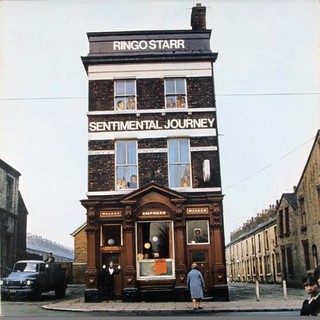
Sentimental Journey is the debut solo album by English rock musician Ringo Starr. It was released by Apple Records in March 1970 as the Beatles were breaking up. The album is a collection of pre-rock 'n' roll standards that Starr recalled from his childhood in Liverpool. As a departure from the experimental quality that had characterised solo LPs by George Harrison and John Lennon since 1968, it was the first studio album by an individual Beatle to embrace a popular music form.
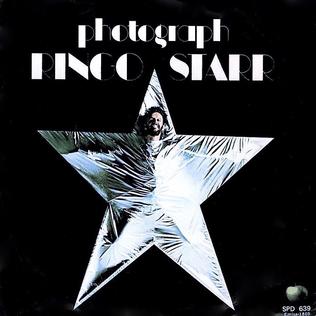
"Photograph" is a song by English rock musician Ringo Starr that was released as the lead single from his 1973 album Ringo. Starr co-wrote it with George Harrison, his former bandmate from the Beatles. Although they collaborated on other songs, it is the only one officially credited to the pair. A signature tune for Starr as a solo artist, "Photograph" was an international hit, topping singles charts in the United States, Canada and Australia, and receiving gold disc certification for US sales of 1 million. Music critics have similarly received the song favourably; Stephen Thomas Erlewine of AllMusic considers it to be "among the very best post-Beatles songs by any of the Fab Four".

The Concert for Bangladesh is a live triple album credited to "George Harrison & Friends" and released on Apple Records in December 1971 in America and January 1972 in Britain. The album followed the two concerts of the same name, held on 1 August 1971 at New York's Madison Square Garden, featuring Harrison, Bob Dylan, Ravi Shankar, Ali Akbar Khan, Ringo Starr, Billy Preston, Leon Russell and Eric Clapton. The shows were a pioneering charity event, in aid of the homeless Bengali refugees of the Bangladesh Liberation War, and set the model for future multi-artist rock benefits such as Live Aid (1985) and the Concert for New York City (2001). The event brought Harrison and Starr together on a concert stage for the first time since 1966, when the Beatles retired from live performance, and represented Dylan's first major concert appearance in the US in five years.

Encouraging Words is the fifth studio album by American soul musician Billy Preston, released in September 1970 on Apple Records. It was the last of Preston's two albums for the Beatles' Apple label, after which he moved to A&M Records. The album was co-produced by George Harrison and Preston. Harrison's songs "All Things Must Pass" and "My Sweet Lord" were issued here for the first time, two months before his own recordings appeared on his triple album All Things Must Pass.

I Wrote a Simple Song is the sixth studio album by American soul musician Billy Preston. Released in November 1971, it was his first album for A&M Records and marked the start of a run of commercial success in the United States that lasted through to the late 1970s. The album includes the hit single "Outa-Space", which won the Grammy Award for Best Pop Instrumental Performance of 1972. Preston included a live version of the instrumental "The Bus", as part of a medley with the Beatles' "Day Tripper", on his 1974 album Live European Tour.

"Power to the People" is a song written by John Lennon, released as a single in 1971, credited to John Lennon/Plastic Ono Band. It was issued on Apple Records and in the US peaked at number 11 on the Billboard Hot 100 and number 10 on the Cashbox Top 100. It also charted at number 6 on the British singles chart. The song's first appearance on album was the 1975 compilation Shaved Fish.

The Concert for Bangladesh is a film directed by Saul Swimmer and released in 1972. The film documents the two benefit concerts that were organised by George Harrison and Ravi Shankar to raise funds for refugees of the Bangladesh Liberation War, and were held on Sunday, 1 August 1971 at Madison Square Garden in New York City. As well as notable performances from Harrison and Shankar, the film includes "main performer" contributions from Harrison's fellow ex-Beatle Ringo Starr, Billy Preston and Leon Russell, and a surprise walk-on from Bob Dylan. Other contributing musicians include Ali Akbar Khan, Eric Clapton, the band Badfinger, Klaus Voormann, Jesse Ed Davis, Jim Horn and Jim Keltner.
"Sing One for the Lord" is a song by American soul musician Billy Preston that was released in September 1970 on his Apple Records album Encouraging Words. It was written by George Harrison and Preston. Although the pair frequently collaborated as recording artists from 1969 onwards, it is their only formal songwriting collaboration. The song is in the gospel style and was written in praise of the two musicians' respective deities.
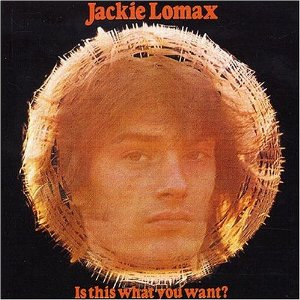
Is This What You Want? is the debut album by English rock and soul singer Jackie Lomax, released in 1969 on the Beatles' Apple record label. It was produced by George Harrison and features contributions from Harrison's Beatles bandmates Paul McCartney and Ringo Starr. The album includes Lomax's debut single for Apple, the Harrison-written "Sour Milk Sea". The US version added "New Day", which was produced by Lomax and released as a non-album single in Britain.

Doris Troy is an album released in 1970 on the Beatles' Apple Records label by American soul singer Doris Troy. It features songs written by Troy and a number of the participants on the sessions, including George Harrison, Stephen Stills, Klaus Voormann and Ringo Starr. Through the extended period of recording, the album became an all-star collaborative effort, typical of many Apple projects during 1968–70, although it was Troy's only album on the Beatles' label. Other guest musicians included Billy Preston, Peter Frampton, Leon Russell, Eric Clapton and members of the Delaney & Bonnie Friends band. Like the Harrison-produced single "Ain't That Cute", Doris Troy failed to chart in Britain or America on release.

"That's the Way God Planned It" is a song by American musician Billy Preston and the title track to his 1969 album of the same name. Issued as a single, the song was Preston's first release on the Beatles' Apple record label, following his guest role on the band's "Get Back" single. The lyrics to "That's the Way God Planned It" partly reflect the long musical apprenticeship Preston had served since childhood, mentored by artists such as Sam Cooke and Ray Charles, while musically the track combines the gospel tradition with rock. Produced by George Harrison in London, the recording also features contributions from Eric Clapton, Keith Richards, Ginger Baker and Doris Troy. Having been edited down to three minutes for its single release, the full version appeared on the album, as "That's the Way God Planned It ".

"All That I've Got " is a song by American soul musician Billy Preston that was released in January 1970 as his third single on Apple Records. It was written by Preston and his fellow Apple artist Doris Troy and produced by George Harrison. In the United States, the single missed the Billboard Hot 100 chart, peaking at number 108. According to Harrison, the song was Preston's musical response to criticism that he had abandoned his black soul roots by embracing rock music.

The Radha Krsna Temple is a 1971 album of Hindu devotional songs recorded by the UK branch of the Hare Krishna movement – more formally, the International Society for Krishna Consciousness (ISKCON) – who received the artist credit of "Radha Krishna Temple (London)". The album was produced by George Harrison and released on the Beatles' Apple record label. It compiles two hit singles, "Hare Krishna Mantra" and "Govinda", with other Sanskrit-worded mantras and prayers that the Temple devotees recorded with Harrison from July 1969 onwards.

"You're Breakin' My Heart" is a song by American singer-songwriter Harry Nilsson, appearing on his 1972 album Son of Schmilsson. It is notorious for the opening line, "You're breakin' my heart / You're tearin' it apart / So fuck you".

"I Wrote a Simple Song" is a song by American soul musician Billy Preston that was first released as the title track to his album of the same name in November 1971. It was written by Preston and his regular collaborator, Joe Greene. The song was also Preston's first single on A&M Records, following the end of his tenure on the Beatles' Apple record label. In the United States, it peaked at number 77 on the Billboard Hot 100. Radio programmers there soon favored the B-side, the instrumental "Outa-Space", which had been Preston's choice for the lead side. "Outa-Space" became a breakthrough US hit for Preston and his first RIAA-certified gold single. The single was released in Britain on January 21, 1972.
References
- 1 2 3 4 Chadbourne, Eugene. "Joseph Greene". AllMusic . Retrieved July 19, 2018.
- ↑ Tobler, John (2011). I Wrote a Simple Song/Music Is My Life (CD booklet). Billy Preston. BGO Records. pp. 4, 6, CD credits.
- ↑ "Joseph Greene: Credits". AllMusic . Retrieved July 19, 2018.
- ↑ Castleman, Harry; Podrazik, Walter J. (1976). All Together Now: The First Complete Beatles Discography 1961–1975 . New York, NY: Ballantine Books. pp. 195–96. ISBN 0-345-25680-8.
- ↑ Castleman & Podrazik 1976, p. 91.
- ↑ Los Angeles staff (June 16, 1973). "Preston Sued for $500,000 by WEP Scribe". Billboard . p. 10. Retrieved July 19, 2018.
- ↑ Late at Night (LP credits). Billy Preston. Motown Records. 1979.
{{cite AV media notes}}: CS1 maint: others in cite AV media (notes) (link)